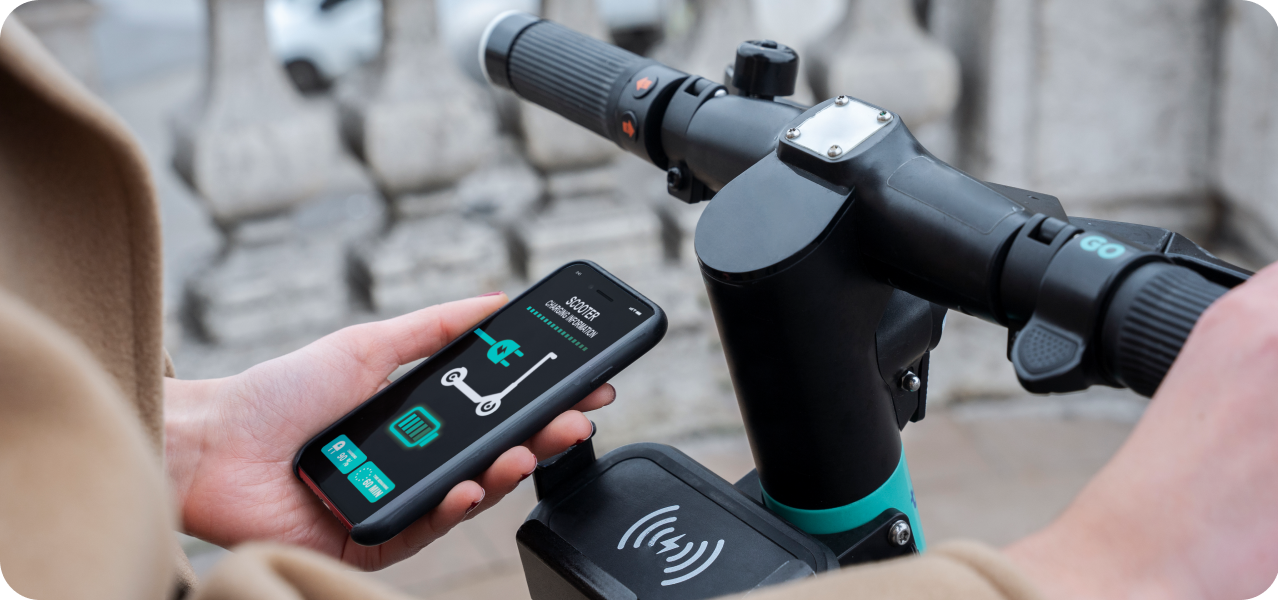Driving Innovation: The Power of IoT and Mobile Tech in Electric Vehicle Management

The surge in smart device innovation is reshaping industries, and electric vehicles (EVs) are at the forefront of this transformation. With capabilities like smart charging, predictive maintenance, and fleet management driven by the Internet of Things (IoT), the EV landscape is evolving rapidly. The recent State of IoT – Spring 2024 report reveals that IoT has firmly established itself as one of the top three technology priorities for corporations.
However, many companies still lag when it comes to leveraging these advanced technologies. If your EV company is among those that barely utilizes IoT, it’s time to harness the power of IoT and mobile technology to stay competitive.
In this blog, we’ll look at implementing some IoT hardware and software solutions to enhance EV tracking and management through mobile applications.
1. Transforming Tracking with IoT and Mobile Applications
Real-time tracking is no longer a luxury but a necessity in effective vehicle management. IoT-enabled devices integrated with mobile applications offer a seamless EV tracking experience. With technologies like Global Positioning System (GPS) and Global Navigation Satellite System (GNSS), fleet managers or even EV rental providers can monitor the precise locations of the vehicles in their fleet from the convenience of their smartphones.
This capability enhances security by providing them with the tools to oversee multiple vehicles simultaneously. With a user-friendly mobile interface, businesses can optimize routes and prevent vehicle unauthorized use.
2. Analyzing Trip Data for Enhanced Insights
Incorporating IoT technology into EV management opens the door to a wealth of data that can enable smarter decision-making. Unlike conventional systems that offer limited tracking information, IoT solutions maintain comprehensive trip histories that are easily accessible through mobile apps.
By analyzing driving patterns and reviewing previous routes, fleet managers and EV rental providers can gain insights into their vehicle performance and energy consumption, promoting energy efficiency and prolonging battery life.
3. Enhancing Safety Through Geo-Fencing
Safety is a paramount concern when it comes to EVs, and IoT technology enhances safety measures through geo-fencing capabilities. With mobile apps, virtual boundaries can be created around specific areas on a map. If a vehicle crosses these boundaries, instant alerts can be sent.
This feature is very useful for fleet management since it allows businesses to enforce operational limits and monitor compliance effortlessly. Additionally, geo-fencing can trigger alerts for events such as hard braking or unusual vehicle movements which provides an extra layer of security and peace of mind for both the drivers and fleet operators.
4. Proactive Battery Monitoring via Mobile Apps
A crucial aspect of EV management is understanding battery health and performance. IoT technology enables real-time battery monitoring that allows fleet managers and EV rental providers to check battery status through mobile apps.
With instant updates on battery levels and estimated remaining travel distance, businesses and fleet managers can make timely decisions regarding charging. This proactive approach not only helps prevent unexpected battery depletion but also optimizes energy usage, enhancing the overall driving experience.
5. Remote Control Features for Convenience
One of the standout benefits of integrating IoT with mobile technology is the ability to control various vehicle functions remotely. The EV can be started, stopped, or immobilized using a mobile app which eliminates the need for traditional keys.
This feature allows fleet managers/ EV rental providers to check if the vehicle is parked securely or activate it remotely in case of emergencies. This functionality enhances security and convenience and gives businesses greater control over their EVs.
6. Streamlining Maintenance and Service Notifications
Regular maintenance is essential for keeping electric vehicles in peak condition, and IoT solutions simplify this process through automated service alerts. Mobile applications can send timely notifications about upcoming maintenance schedules, helping business owners stay proactive about their vehicle care.
Plus, tracking maintenance history through the app allows for easy record-keeping, ensuring easy management of repairs and servicing. This data-centric approach minimizes the risk of unforeseen issues and promotes the longevity of electric vehicles.
7. Comprehensive Diagnostic Capabilities
IoT technology facilitates detailed vehicle diagnostics that empower fleet managers and EV rental providers with critical insights. By connecting to the vehicle’s Brushless Direct Current (BLDC) controller via Controller Area Network (CAN) bus, they can monitor essential parameters such as speed, battery levels, and overall vehicle health.
Accessible through a user-friendly mobile app, this information enables informed decision-making. Whether it’s optimizing charging cycles or addressing potential mechanical issues, the data derived from IoT diagnostics enhances the overall management of electric vehicles.
Conclusion
The integration of IoT and mobile technology in EV management is no longer a good-to-have, but essential. As the EV market evolves, the potential for IoT technology is immense. It’s time businesses and fleet managers and EV rental providers take advantage of these advancements and drive towards a smarter, more connected future in transportation.

